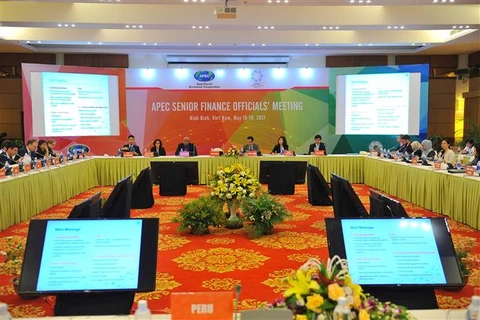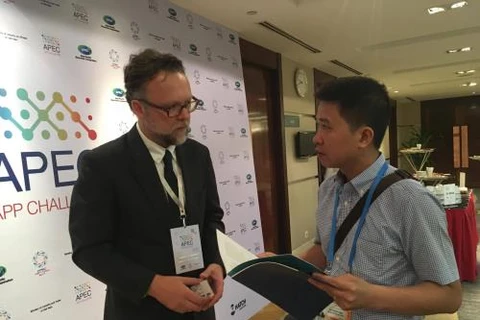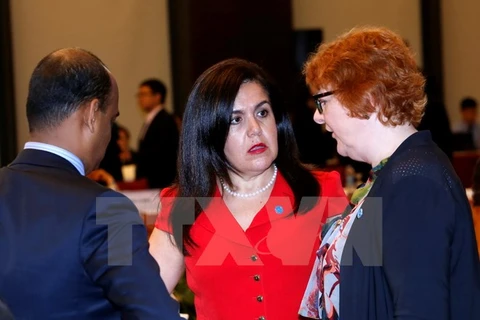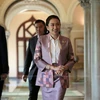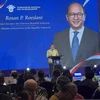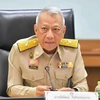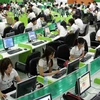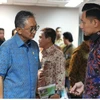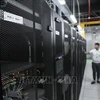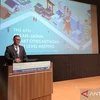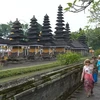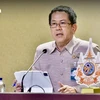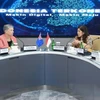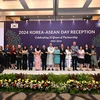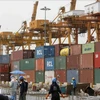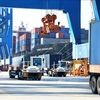Hanoi (VNA) – The Asia-Pacific Economic Cooperation (APEC) 2017 Second Senior Officials’ Meeting (SOM 2) concluded in Hanoi on May 18, with fruitful outcomes in various fields.
Presided over by Vietnam’s Deputy Foreign Minister Bui Thanh Son, who is APEC 2017 SOM Chair, the two-day meeting discussed APEC’s long-term cooperation orientations and proposals on the reform of APEC apparatus to make it more effective in promoting initiatives benefiting businesses and people.
Comprising nearly 50 meetings and workshops, SOM 2 drew about 2,300 delegates from 21 member economies, the business community, scholars as well as representatives from international organisations and ministries and sectors of host Vietnam.
The SOM 2 and related meetings played a key role in speeding up the implementation of the theme and four priorities of the APEC Year 2017 that were approved at the SOM 1 in Nha Trang in March.
Major outcomes of the meeting include member economies’ strong support for APEC’s role as a motivation for regional economic growth and connection and a cradle of cooperation and linkage ideas for common prosperity of the Asia-Pacific region.
APEC member economies showed determination to complete the Bogor Goal on trade and investment following the set roadmap in 2020 in combination with creating equal opportunities for all people and enterprises to join and benefit from regional economic growth and connection achievements, thus contributing to the global efforts on sustainable development.
Meanwhile, participants at the Multi-Stakeholder Dialogue on APEC Towards 2020 and the Future concurred that the post-2020 APEC Vision is a significant issue that needs to be discussed during 2017. They also proposed timetable, targets and contents of cooperation as well as specific steps to build the vision.
At the same time, the High-Level Policy Dialogue on Human Resources Development in the Digital Age approved a framework on human resources development in the digital age, which will be submitted to APEC leaders. As an initiative proposed by the host country, the framework is expected to support APEC efforts to develop skilled human resources to meet new demands of the digital era and implement strategies on quality and inclusive growth.
The meetings also reviewed and accelerated the implementation of long-term programmes of the forum, especially the action programmes of member economies to realise the new APEC Agenda on structural reform, the APEC Connectivity Blueprint, the APEC roadmap on improving services competitiveness, and Lima Declaration on the Free Trade Area of the Asia-Pacific (FTAAP).
Many new ideas were also given on four priorities of APEC Year 2017, especially the proposal on designing an action plan to promote economic, financial and social inclusion in the APEC region with an aim of giving all people equal opportunities to benefit from regional growth and connection.
The SOM 2 and related meetings marked the halfway of Vietnam’s hosting of APEC Year 2017, showing the country’s efforts to strengthen international integration as well as its view of considering the Asia-Pacific region and APEC a focus of its foreign policy.
Six Vietnamese ministries namely the Ministries of Industry and Trade; Foreign Affairs; Labour, Invalids and Social Affairs; Planning and Investment; Science and Technology; and Construction took the charge of the Chair and Co-chair of committees, working groups and activities during the SOM 2.
Many activities were held on the sidelines of the meetings, including tours of President Ho Chi Minh’s house in Hanoi and Sa Pa in the northern province of Lao Cai, thus introducing to delegates the culture, people as well as trade, investment and tourism potential of Vietnam.-VNA
Presided over by Vietnam’s Deputy Foreign Minister Bui Thanh Son, who is APEC 2017 SOM Chair, the two-day meeting discussed APEC’s long-term cooperation orientations and proposals on the reform of APEC apparatus to make it more effective in promoting initiatives benefiting businesses and people.
Comprising nearly 50 meetings and workshops, SOM 2 drew about 2,300 delegates from 21 member economies, the business community, scholars as well as representatives from international organisations and ministries and sectors of host Vietnam.
The SOM 2 and related meetings played a key role in speeding up the implementation of the theme and four priorities of the APEC Year 2017 that were approved at the SOM 1 in Nha Trang in March.
Major outcomes of the meeting include member economies’ strong support for APEC’s role as a motivation for regional economic growth and connection and a cradle of cooperation and linkage ideas for common prosperity of the Asia-Pacific region.
APEC member economies showed determination to complete the Bogor Goal on trade and investment following the set roadmap in 2020 in combination with creating equal opportunities for all people and enterprises to join and benefit from regional economic growth and connection achievements, thus contributing to the global efforts on sustainable development.
Meanwhile, participants at the Multi-Stakeholder Dialogue on APEC Towards 2020 and the Future concurred that the post-2020 APEC Vision is a significant issue that needs to be discussed during 2017. They also proposed timetable, targets and contents of cooperation as well as specific steps to build the vision.
At the same time, the High-Level Policy Dialogue on Human Resources Development in the Digital Age approved a framework on human resources development in the digital age, which will be submitted to APEC leaders. As an initiative proposed by the host country, the framework is expected to support APEC efforts to develop skilled human resources to meet new demands of the digital era and implement strategies on quality and inclusive growth.
The meetings also reviewed and accelerated the implementation of long-term programmes of the forum, especially the action programmes of member economies to realise the new APEC Agenda on structural reform, the APEC Connectivity Blueprint, the APEC roadmap on improving services competitiveness, and Lima Declaration on the Free Trade Area of the Asia-Pacific (FTAAP).
Many new ideas were also given on four priorities of APEC Year 2017, especially the proposal on designing an action plan to promote economic, financial and social inclusion in the APEC region with an aim of giving all people equal opportunities to benefit from regional growth and connection.
The SOM 2 and related meetings marked the halfway of Vietnam’s hosting of APEC Year 2017, showing the country’s efforts to strengthen international integration as well as its view of considering the Asia-Pacific region and APEC a focus of its foreign policy.
Six Vietnamese ministries namely the Ministries of Industry and Trade; Foreign Affairs; Labour, Invalids and Social Affairs; Planning and Investment; Science and Technology; and Construction took the charge of the Chair and Co-chair of committees, working groups and activities during the SOM 2.
Many activities were held on the sidelines of the meetings, including tours of President Ho Chi Minh’s house in Hanoi and Sa Pa in the northern province of Lao Cai, thus introducing to delegates the culture, people as well as trade, investment and tourism potential of Vietnam.-VNA
VNA

